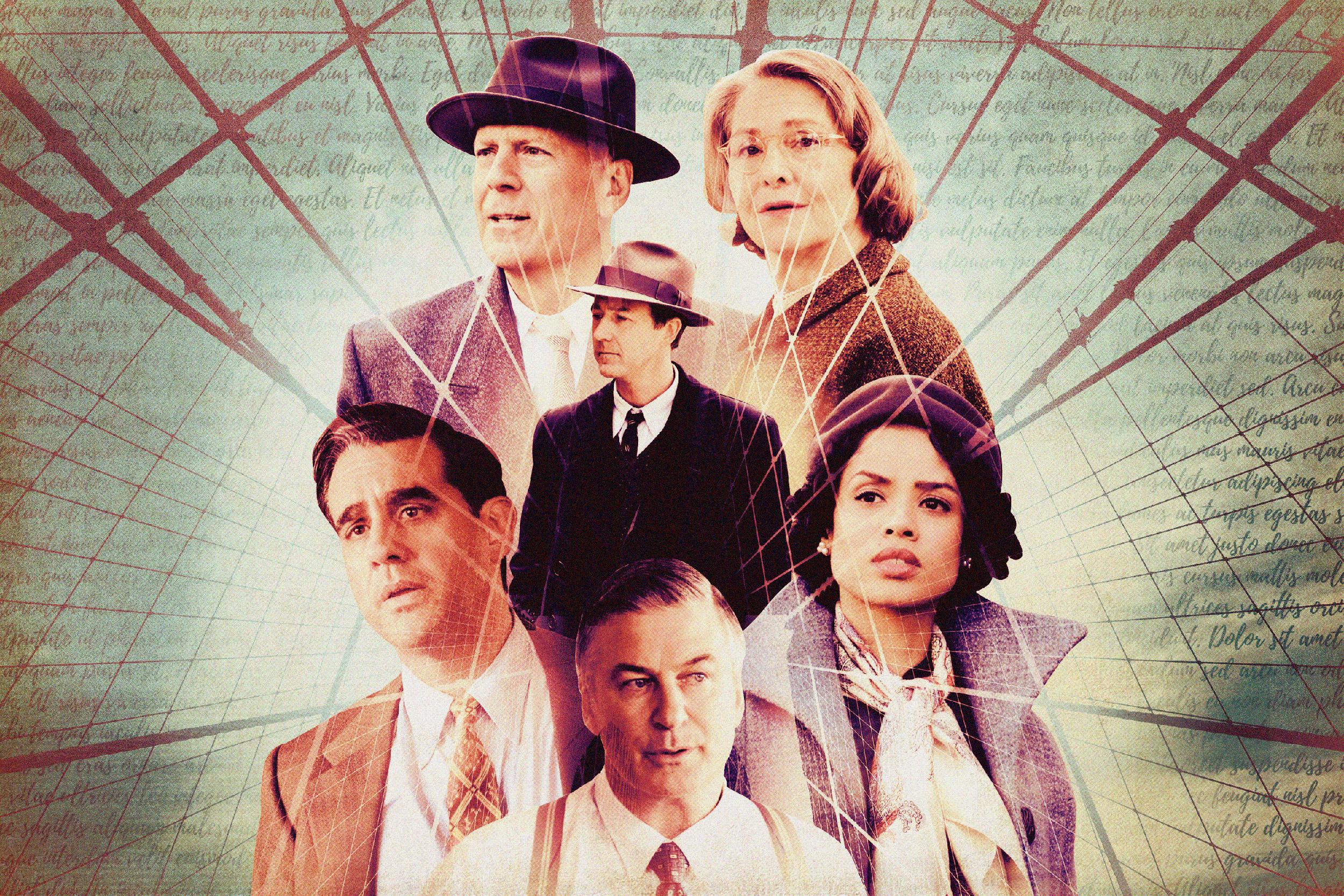
Let me tell you about my favorite 2019 movie scene to date, which is a simple thing, really: Edward Norton and Gugu Mbatha-Raw slow dance to a smoky jazz ballad. Totally simple, so long as I don’t try to explain anything else about it.
The movie is Motherless Brooklyn, loosely adapted from Jonathan Lethem’s 1999 novel, a hard-boiled but soft-hearted mystery yarn that has aged better than most turn-of-the-century literary sensations written by men named Jonathan. Norton directed, and wrote the screenplay, and moved the action from the present day to the ultra-noir 1950s, and stars as Lionel Essrog, a struggling NYC private eye prone to harsh facial tics and wild gestures and bombastic verbal outbursts. (The book specifies that he has Tourette’s; the movie opts for the vaguer “I got something wrong in my head.”) “Kiss her face all night, Bailey!” he blurts out shortly after meeting semi-cute with Mbatha-Raw, and she giggles, though Lionel’s further gently sincere explanations for these outbursts—“I say funny things, but I’m not trying to be funny”—allow him some measure of leeway, even when he’s blurting out, for example, “Tits on a Tuesday!”
Mbatha-Raw plays Laura, a Harlem activist doing battle with a racist, power-mad, eminent domain-wielding Alec Baldwin, whose character’s name is “Moses Randolph,” though he is very obviously channeling infamous “master builder” Robert Moses. (Randolph is also, with his hyper-villainous outbursts about the men who take what they want and get things done and make this country great, a very very obvious nod to that other infamous master builder Baldwin spends a lot of his time channeling.) The smoky jazz ballad, meanwhile, is a Wynton Marsalis arrangement of an extra-warbly new Thom Yorke tune, “Daily Battles,” that prominently plays earlier in the movie, despite this being a ’50s period piece. The slow-dance jazz version is performed at a Harlem nightclub by a band led by a chilly and ultra-cool Michael Kenneth Williams, whose character’s name is “Trumpet Man,” though he is very very very obviously channeling Miles Davis. (“So what!,” Lionel blurts out at the club, and Trumpet Man likes him immediately.)
The song, in this ultra-cool smoky-jazz-club form, is alarmingly beautiful; the camera delicately spins around Lionel and Laura as they dance, their tentative embrace mirroring your anxiety as you brace for Lionel to blurt out some goofy non sequitur (“Lasagna ass!” he announces, late in the book) and kill the mood, as he does on almost every page of the novel and the screenplay. This one time, he never does, though. The song ends, and the spell breaks, and the convoluted film-noir plot kicks back into gear, and soon Lionel’s getting beat up in a seedy back alley as a mysterious fedora-and-trench-coat figure looks on, and later Trumpet Man’s trumpet reappears to save some modest part of the day.
You take your simple pleasures, then, where you can. This is a convoluted experience, with a convoluted 20-year path to the screen, and a convoluted relationship with the novel it’s adapting. Furthermore, given its non-superhero-IP origins, the film, which opened Friday, was resigned to a very simple box office fate: It bombed. I loved it, though. Motherless Brooklyn works great if you work to grasp all that context and backstory; it might work even better if you don’t bother trying to grasp any of it at all.
Let me tell you about my favorite scene in a 1999 book, which is when the tic-wracked hero of Motherless Brooklyn hears Prince’s “Kiss” on the radio and recognizes himself immediately. “I don’t know whether The Artist Formerly Known as Prince is Tourettic or obsessive-compulsive in his human life,” Lionel tells us. “But I know for certain he is deeply so in the life of his work.” Also: “Prince’s music calmed me as much as masturbation or a cheeseburger. When I listened to him I was exempt from my symptoms.” It’s an awful shame, that the movie shifts the action to the ’50s and thus swaps Prince for Very Obviously Miles Davis. But as you watch Edward Norton scat helplessly along to a Michael Kenneth Williams trumpet solo, you’ll feel yourself getting over it.
Lionel is one of four luckless orphans taken under the wing of Frank Minna, a small-time Brooklyn hood whose dream, apparently, is to start a car service that is secretly also a detective agency. As Motherless Brooklyn opens, Minna is murdered as Lionel and one of his fellow yes-men look on helplessly; from there the book and movie split into separate, and equally labyrinthine, whodunit plots where the style easily and pleasantly overwhelms the substance. Bruce Willis plays Minna in the movie, and I’d have dug 20 more minutes just of him reciting Lethem’s dialogue near verbatim, as when he insists that his yes-men not arm themselves: “That’s how I sleep at night, you have to know. You with no gun. I wouldn’t want you chuckleheads coming up a stairway behind me with a hairpin, with a harmonica, let alone a gun.”
The movie’s cast (Willem Dafoe, Cherry Jones, Bobby Cannavale) is indeed stacked, and somehow effective even when you suspect somebody’s been spectacularly miscast: Leslie Mann shows up as Minna’s long-suffering wife and struggles to wrestle the whole film-noir-damsel concept to the ground. (“Always with the cryptic shit,” she complains of her late husband. “And then he goes and gets whacked.”) Lionel is a monumentally appealing figure in the book, a very precise balance of sophisticated and crude, sneakily shrewd and totally helpless; even his one brief sex scene avoids getting too gratuitous, too silly, or worse yet too sexy. (“My hand felt less a hand than a catcher’s mitt, or Mickey Mouse’s hand, something vast and blunt and soft,” Lethem writes.) It’s a showy theoretical film role, and rereading the book now you can totally imagine Edward Norton flipping for it immediately, and fashioning the movie as a capital-A Acting showcase nonpareil.
The book’s conspiracy is a filthy-windshield blur of vivid scenery. An Upper East Side Buddhist zendo. A Ferris wheel at a makeshift Brooklyn carnival, set upon by small-time thugs. Two ancient Italian mobsters brooding in an even more ancient brownstone. A hard-boiled confrontation between Lionel and four hapless henchmen crammed into a tiny car. (The other line I wish Norton had transferred over from the book is, “Guys like you could kill me and you still wouldn’t scare me.”) A seafood restaurant in coastal Maine; a final showdown between two figures framed by a towering lighthouse, guns drawn, though both guns end up tossed out toward the sea, along with one of Lionel’s shoes.
Lethem’s ambition is palpable (you think these sentences are long), and so is his reverence for dimestore-detective antics: This is the sort of book in which a man woos a lady by reading her excerpts from Ross Macdonald novels. Whether the mystery’s solution qualifies as satisfying is beside the point: It’s enough, as always, to suggest a vast conspiracy, and then thrill as a charismatic but nearly clueless gumshoe stumbles around from deep within it.
Motherless Brooklyn the movie widens that conspiracy immeasurably: In some retellings of New York City history, Robert Moses is a Thanos-caliber villain, wiping out entire neighborhoods with one contemptuous snap of his fingers. It is very easy—too easy—to imagine Alec Baldwin in the role, smearing it up, drawing the real-world comparisons that hardly need to be drawn whether you buy those comparisons or not. The action, when it deigns to appear, is somehow flashier on the page than onscreen: The book climaxes with a rad (and non-grisly) deployment of those severe-tire-damage spikes they install in parking lots. Eventually, sure, we get to watch Norton and Mbatha-Raw scamper up fire escapes and across a moonlit rooftop, but the fireworks here are mostly verbal by design: “You don’t want me handling your bris,” Lionel jokes to one of his detective buddies, and Norton’s camera cuts away before the onscreen belly laugh has even crested.
In another era—a recent one, even—this all has modest-blockbuster-as-Oscar-bait potential. (L.A. Confidential crossed with Rain Man, is how the sweaty TV ads pitched it.) Now, it’s just one more good-to-great flick vaporized by Joker. But that fate—a pyrrhic victory where the likable individual barely survives while the groaning and heartless machine rages on—unfortunately fits Motherless Brooklyn quite well, less a Hollywood ending than a grim and graceful pitch-black shrug. It’s a fantastic book that largely got the industry praise it deserved; it’s a conspicuously mutated lite-macho flick that won’t get the praise or attention it deserves at all. That jazz-club slow dance will stick with you, though, for both its simple pleasures and its very very very very complicated ones.

